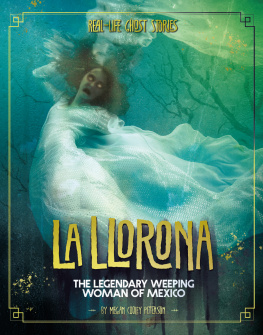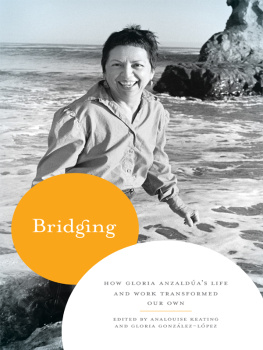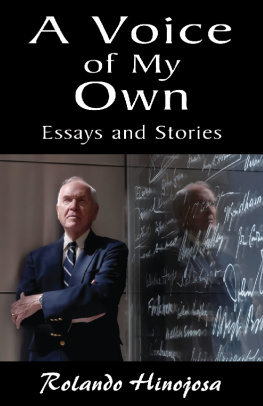La Llorona on the Longfellow Bridge
poetry y otras movidas 19852001byAlicia Gaspar de Alba
para Dolores y Soledadso full of duendeand, for the abandoned
This volume is made possible through grants from the City of Houston through The Cultural Arts Council of Houston, Harris County.
Recovering the past, creating the future Arte Pblico Press
University of Houston
452 Cullen Performance Hall
Houston, Texas 77204-2004 Cover art La Llorona Desperately Seeking Coyolxauhqui in Jurez,
2003, by Alma Lpez
Cover design by Adelaida Mendoza Gaspar de Alba, Alicia, 1958 La Llorona on the Longfellow Bridge: poetry y otras movidas / by Alicia Gaspar de Alba p. cm.
ISBN 1-55885-399-5 (pbk. : alk. paper) 1. III. III.
Title.
PS3557.A8449L57 2003

The paper used in this publication meets the requirements of the American National Standard for Information SciencesPermanence of Paper for Printed Library Materials, ANSI Z39.48-1984. 2003 Alicia Gaspar de Alba 3 4 5 6 7 8 9 0 1 2 10 9 8 7 6 5 4 3 2 1
Contents
Tracking La Llorona
I confess: there are those who will tell you that I deride the self-indulgent practice of writers publishing their dreams and journal entries (unless its a fictional technique, which I liberally employed in my novel on Sor Juana). But I also know that often, some of our best work is tucked away in those stacks of notebooks we writers accumulate like karma. As I have been contemplating how to introduce this second collection of poetry y otras movidas, I remember snippets of amazingly profound insights I wrote down years ago in one of those notebooks, and I search frantically through twenty years of written karma to find those words, written years before I became an academic, when I had more time than money, when I could afford the luxury to theorize, that is, contemplate, my own poetics. If I knew exactly what Id said, I wouldnt need to indulge in this archaeology of private knowledge, but all I have is the memory of having said something pertinent. I can feel it there, on the tip of my tongue, the distinct, if subtle, pressure of the words on the loam of my forty-four-year-old brain; but, alas, I must resort to digging, and digging brings up sand and bones and spiders, and an occasional treasure.
Like this, from the introduction I wrote to my M.A. Thesis in Creative Writing at the University of Texas at El Paso (from which I have poached before), titled Introspection Week: Taking Time Out to Talk about Theoretics, or, Who Says Chicanas Can Write? November, 1983 I think poets are crazy in the ultimately best sense of the word. The sense that made us proud in high school when someone would say youre crazy. To be crazy, then, meant to be free and honest and open to all sorts of things like ditching and queer sex. To be crazy, now, open to the world, is what gives me the freedom and the honesty to write a poem. I can always tell when parts of a poem start to synchronize inside my head, usually in the middle of the night when images keep rolling around on my tongue and theres no way I can go to sleep, no way I can close my eyes to that buzzing, shapeless presence I know is a poem. So I get up and write, not at all certain what Im going to say or how the poem is going to look.
The logic of writing poetry, as Wallace Stevens says, is an irrational one; it occurs spontaneously and unaccountably in the rational mind; it is born of listening to something that cant be heard except in the deepest crevices of the skull. Perhaps this is what Manuel Torres, the Andalusian artist, referred to as black sounds when he said whatever has black sounds has duende. Duende, to the people of Andalusia, is more than a hobgoblin or a poltergeist. It is a power that expresses itself through all forms of art. But not all artists, all poets, all bullfighters, have duende, nor do they all hear black sounds. These are earth forces, according to Federico Garca Lorca, that exist only in the blood.
They have, he says, nothing to do with aptitude or technique or virtuosity. the Duende loves ledges and wounds he enters only those areas where form dissolves in a passion transcending any of its visible expressions. I think my duende made her arrival during a crash-course, six-week poetry seminar in the summer of 1981my first graduate workshop. I was going through a divorce and living in a tiny, greasy, roach-ridden restaurant in downtown Jurez. During the day I taught English as a Second Language in the General Motors maquiladoras; nights I was a cocktail waitress at Monikas, a classy El Paso club. It was at this insane point in my life that I started crawling out of bed in the dark morning hours to write poems.
There she was, my duende, pulling on my eyelashes, nudging at my ribs, playing hide-n-seek in my mind. She terrified me. Poetry terrified me because it would take over me, not caring that I had to write on a cold, metal table and squint my eyes under an opaque, fluorescent light. I wrote six poems for that summer workshop, and at least four of them (in my humble opinion) had duende, that is, they were spawned from the ledges and wounds of all of the borders I was crossing at the time. I was leaving my white husband, who was also my best friend from high school and my first poetry mentor, with whom I shared a two-bedroom duplex in El Paso and a purebred basenji named Kenge Bambuti. I was in love with a Mexicana eleven years older than me, who often couldnt afford to pay her rent or her gas bill to that greasy spoon restaurant where we slept in a back room on a broken-down sofa, surrounded by piles of clothing, old shoes, empty tequila bottles.
So many contradictions. So many black sounds. Voice. I never understood what voice meant until I started teaching composition, because thats what was always missing in my students papers. Finding a voice, Seamus Heaney says, means that you can get your own feeling into your own words and that your words have the feel of you about them.feelings, then I have found my voice. My voice is also a fronteriza voice.
Had I not grown up in an environment so deeply infused with magic and superstition and history. Had I not been able to understand all those horrifying cuentos about La Llorona, that mythical, mystical Wailing Woman of the Mexican and Chicano culture who appears in my writing as everything from ghost to guardian angel, and who is my primary symbol of individuation. Had I never known the feeling of smuggling avocados or cousins without green cards across the border. Had I never played hide-n-seek or held sances in the desertboth great opportunities for noticing the slightest movement of sagebrush, the effect of moonlight on the mesquite. Had I not lived ten minutes away from La Mariscal, the infamous red-light district in Jurez where I spent numerous evenings searching for an Aztec princess named Susana. Had my imagination not been enticed and enriched by this frontera landscape which bred me, had I been born to only one world, I cant even imagine what kind of writer Id be, or if Id be a writer at all.
My words, my place on the maptwo sides of the same coin. When I got married at nineteen and changed my name from Gaspar de Alba to Noreen, I instantly lost half of my identity. The only time I signed Alice Noreen to the bottom of a poem, I drank myself to sleep. That was the name of an orphan who had stabbed her own mother. I guess I know now why La Llorona has always haunted me. 










 The paper used in this publication meets the requirements of the American National Standard for Information SciencesPermanence of Paper for Printed Library Materials, ANSI Z39.48-1984. 2003 Alicia Gaspar de Alba 3 4 5 6 7 8 9 0 1 2 10 9 8 7 6 5 4 3 2 1
The paper used in this publication meets the requirements of the American National Standard for Information SciencesPermanence of Paper for Printed Library Materials, ANSI Z39.48-1984. 2003 Alicia Gaspar de Alba 3 4 5 6 7 8 9 0 1 2 10 9 8 7 6 5 4 3 2 1 